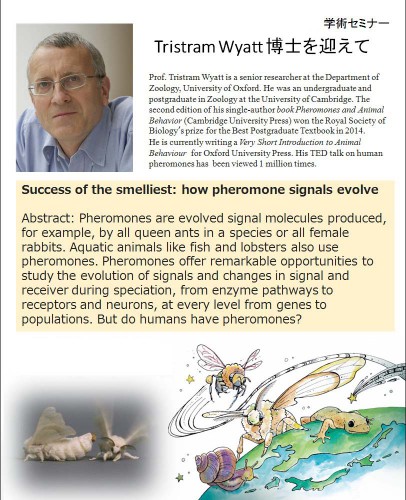神崎亮平先生(東京大学)と尾崎まみこ先生(神戸大学)より、学術セミナーの
ご案内をいただきました。詳細は以下をご覧ください。
Title: Success of the smelliest: how pheromone signals evolve
Speaker: Dr. Tristram Wyatt
(Department of Zoology, University of Oxford)
<第1回>
日時:2016年3月4日(金) 午後1時30分から3時
会場:東京大学先端科学技術研究センター3号館南棟 中2階セミナー室
http://www.brain.rcast.u-tokyo.ac.jp/access/index.html
問い合わせ先:櫻井健志先生
(Tel: 03-5452-5198, E-mail: sakurai@brain.imi.i.u-tokyo.ac.jp)
<第2回>
日時:2016年3月8日(火)午後3時〜4時
会場:神戸大学理学部C棟 C118室
http://www.kobe-u.ac.jp/guid/access/rokko/rokkodai-dai2.html
(神戸市バス36系統・神大文理農学部前下車)
問い合わせ先:尾崎まみこ先生
(Tel: 078-803-5718, E-mail: mamiko@port.kobe-u.ac.jp)
Abstract: Pheromones are evolved signal molecules produced, for example, by all queen ants in a species or all female rabbits. Aquatic animals like fish and lobsters also use pheromones. Pheromones offer remarkable opportunities to study the evolution of signals and changes in signal and receiver during speciation, from enzyme pathways to receptors and neurons, at every level from genes to populations. But do humans have pheromones?
Prof. Tristram Wyatt is a senior researcher at the Department of Zoology, University of Oxford. He was an undergraduate and postgraduate in Zoology at the University of Cambridge. The second edition of his single-author book Pheromones and Animal Behavior (Cambridge University Press) won the Royal Society of Biology’s prize for the Best Postgraduate Textbook in 2014. He is currently writing a Very Short Introduction to Animal Behaviour for Oxford University Press. His TED talk on human pheromones has been viewed 1 million times.


